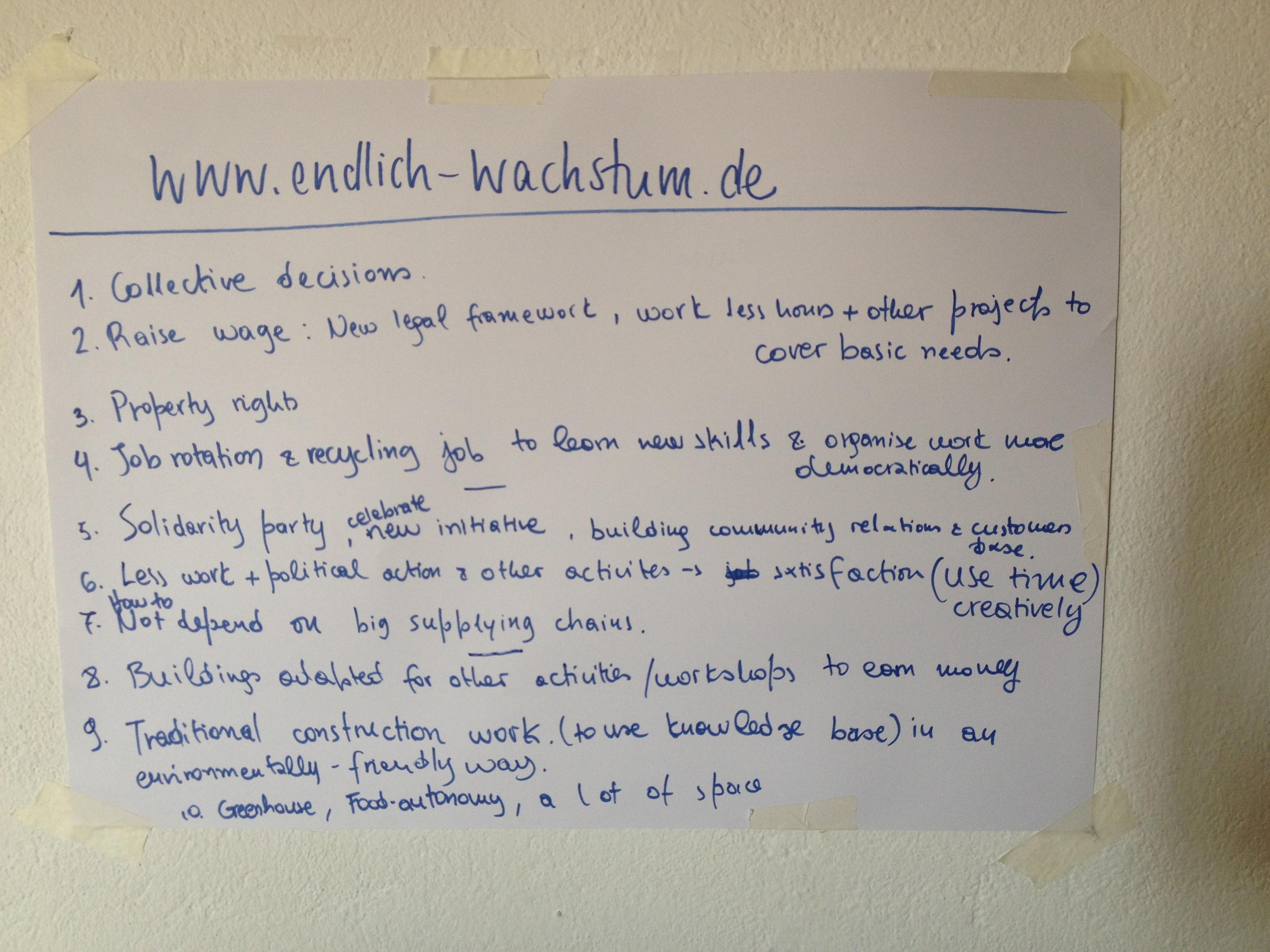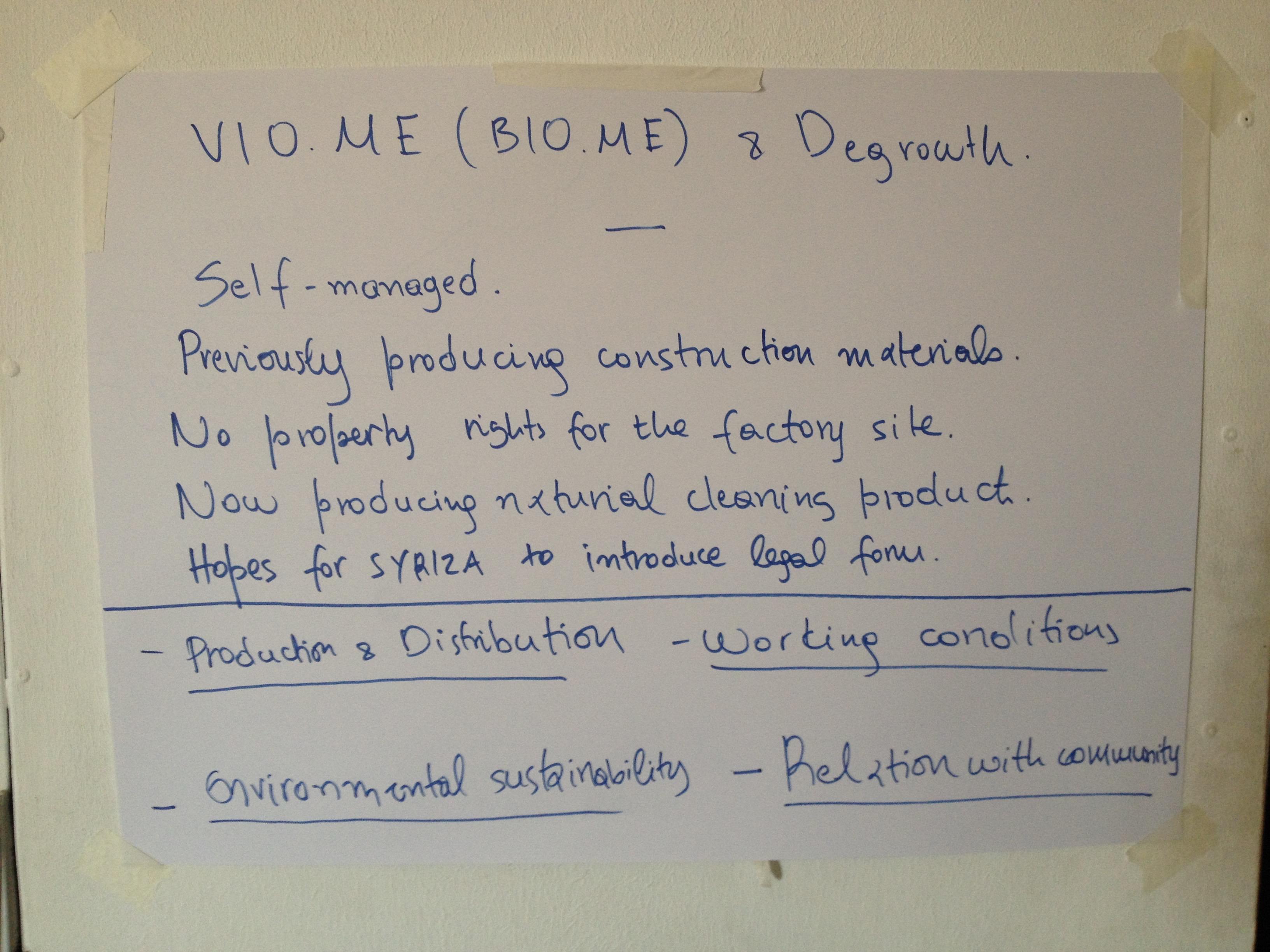
TTT – Train the Trainer notes
TTT – Train the Trainer
Introduction
Examples to what could be done to train people in degrowth?
“Teach” people that are not so open to the subject/not so open to participatory methods in general without imposing “degrowth ideals” and rather make people think about the various dimensions of degrowth, how to envision a different world (open perspectives on different ways of organizing society)
Susanne:www.endlich-wachstum.de
PRACTICAL EXAMPLE (by Christina Sakali):
1) Presenting case-studies from own countries and thinking about them in a degrowth perspective
Exercise: Self-managed factory in Greece – employers left the factory because of the crisis, and workers that lost jobs decided to run the factory themselves
VIO.ME (BIO.ME - greek)
Main activity: previously producing construction materials
Present: the factory is not legal (no property rights) – problems with security, they have to guard everything 24/7; they can’t produce construction materials, they started to produce natural cleaning products; they sell them locally and some externally. To make them legal, they are trying to construct a social enterprise. There is no legal framework to legalize self-managed enterprises. Work is collective and decisions too, 300€/month. 40-50 people before factory closed, 22 people now.
Think of this in a degrowth perspective – Is this consistent with degrowth? How can it be more consistent with degrowth? Which elements of organization of a enterprise of this type are connected with these dimensions?
- Production & distribution
- Working conditions
- Environmental sustainability
- Relation with community
E.g.: Working conditions group
Degrowth companies – self organized, collective decisions (assemblies), equal salaries.
Problems – 300€ is precarious, how can they earn more money?
To be more degrowth: new legal framework; clarification of property rights – security about the property; resource exchange to complement the salary (e.g. other communitarian projects such as gardens); have some structure inside of them, rotating jobs and recycling jobs (overcoming vested power and interests)
Connection with local community – bring people to the factory with a party (instead of marketing campaign)
Self-organized kindergarten in the factory → fix gender balance problem
Factory is not all occupied; there can be space for co-working or organized industry to complement one another (share factory space by having complementary industries inside the same buildings. This is already common in some chemical industries, it could be an inspiration)
Use previous knowledge to new activities but recycled in some way to be more environmental-friendly (not abandon it)
Search for autonomy in food and electricity, since they have space (greenhouses, renewable energy, rainwater collection)
Feedback to Cristina method:
It could be interesting to pass around photos/action cards – making the presentation more visual
Methodology: first a common case study and various groups in the morning; in the afternoon it could be the same exercise with case studies from other countries. It is motivational to take the exercise until the end, construct a common proposal in the end and having the possibility to give them an action (e.g. proposals can be communicated to the actual people)
INDIVIDUAL CHALLENGE
Subject – methodology – myself (personality)
What I would like to transmit? How would I like to transmit it? Target group?
TTT General discussion
- 3h sessions are good to allow informal breaks
- TTT challenge allow for inspiration of others
- Courses to give the tools for turning degrowth theories in a more concrete thing to “teach”
- Positive exchanging experiences between participants, especially from different countries
- Visit projects that apply somehow degrowth principles
- How to fund courses and also how not to depend on public money
- How to train people from different backgrounds, difficult economic situations, not aware of the problem
- Open debate spaces with different groups of people, in a voluntary basis: communities, public services
- Degrowth trainer is different from a degrowth course organizer (don’t mix roles)
- Difficulty on extracting the essence of the courses (how to connect fragmented information)
- Incorporating contents and methods in the existent teaching opportunities (close the cycle to the mainstream) – insert the degrowth ideals as critical thinking education
- Learning process for the network can also be enriched with teaching experience from many people (how to convey certain issues, experiences from using certain methodologies)
- Not having a topic to focus might be an obstacle to plan a course (degrowth is sparse concept)
- 1107 Aufrufe


